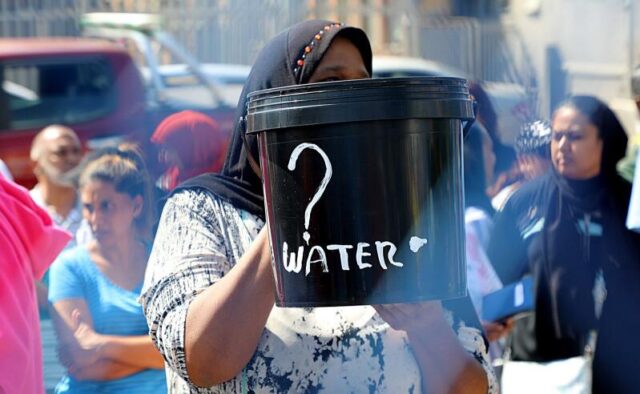Access to water has become a major problem in South Africa, alongside load shedding, as residents in Johannesburg and Durban vent their frustrations over the recent and ongoing crisis.
TO SAY that residents in Johannesburg and Durban are highly frustrated over the ongoing water crisis would be an understatement.
The question of the leadership’s priorities in both these major cities have also been a burning topic on the lips of residents and local councillors, as they were absent during the recent outages.
In the eThekwini Municipality, residents towards the northern part of the metro were left without water from Monday, September 18 until around Tuesday, September 26.
The water is back, but has not returned to its normal pressure levels as reservoirs in the relevant facilities are not at optimum operating levels, the city confirmed.
Last week, IOL spoke to Devasha Nair, a resident in Somerset Park in uMhlanga, who explained the situation on the ground.
Nair said the community was inconvenienced in their working day and had to go collect water and perform basic ablution activities at other people’s houses outside their area.
On Wednesday, we spoke to her again about the mood among residents, which she described as absolute frustration.
“I think everyone was just frustrated at that point. We have been in communication over WhatsApp and you could tell that people were angry and frustrated but we were just trying to get through it peacefully. With us and my neighbours, we had to keep going out to find a place with water,” Nair explained.
She said she did not see Durban mayor Mxolisi Kaunda in the uMhlanga area during the outage.
eThekwini Municipality’s head of Water and Sanitation, Ednick Msweli, confirmed that the outage was caused by an air valve that had been tampered with, while another valve had been vandalised.
“The affected reservoirs are expected to take at least two days to fully return to normal levels. As a proactive and preventative measure, the city will be installing pressure gauges at strategic points on the bulk aqueduct pipeline and will link this up with our telemetry system where we monitor the reservoir levels,” the municipality said.
Over the week-long outage, however, Kaunda was not seen on the ground to bring calm to the frustrating situation.
Kaunda attended the Durban Business and Fashion Fair at the ICC, which was held from September 20 to 24, the DA reported.
IOL also asked the city if Kaunda attended any of the affected sites during the outage and is awaiting a reply.
Ward 33 councillor Nicole Bollman told IOL that the mayor’s representatives attended to the issues that arose during the recent outage.
Nevertheless, the problem was rectified in under 10 days and the city has also announced that it is budgeting R1 billion in the 2023/24 financial year to address water infrastructure challenges.
In Johannesburg, Water and Sanitation Minister Senzo Mchunu addressed residents in the south that were affected by the 33-day and counting water crisis.
Despite frustration among residents, both ward councillor Michael Crichton and Linmeyer resident Cristina de Olivier said they were grateful for the minister’s time and effort, but also stated that Joburg mayor Kabelo Gwamanda was not helpful at all in the situation.
Residents in #southhills now waiting for 30 Minutes for the Minster of water and sanitation @senzo_mchunu. This is a human rights crisis and to treat residents, who have not had water for 31 days this way is shocking.@tyrell_meyers@mikecrichton@KabeloGwamanda @MandyWiener pic.twitter.com/ocFFvTYb2s
— Cllr Nicole van Dyk (@MyLeaderNicole) September 26, 2023
There has also been a back and forth tussle between Mchunu and Gwamanda, after the mayor was slammed for his absence and choosing to attend the unveiling of a new street name instead.
Gwamanda hit back at the minister, saying it was not the city’s infrastructure that was causing the problems.
Councillor Crichton and De Olivier were present at the minister’s meeting on Tuesday.
Based on information from authorities, there are problems at water tower facilities, including cracks in a water tower and ageing systems, Crichton explained.
“I can tell you that there is extreme frustration among these residents, I mean it’s been over a month, how would anyone react to something like this? We go for long spells at a time without water and on top of that load shedding here in the south.
“I think the way the problem has been dealt with by the mayor’s office has not been the best, but as frustrated as we all are, I do appreciate Minister Mchunu’s time and effort. He did come through with a PowerPoint plan about how they were going to install a sump to relieve pressure on the system,” the DA councillor told IOL.
But the sump solution cannot work during load shedding, active community member De Olivier explained.
“They proposed installing a sump to hold water and try and avoid airlocks in the system, but how the hell will the sump work with load shedding? If there is a power outage in an area where they put the sump, it will be pointless, we will still have no water during load shedding,” she said in a frustrated tone.
– IOL








